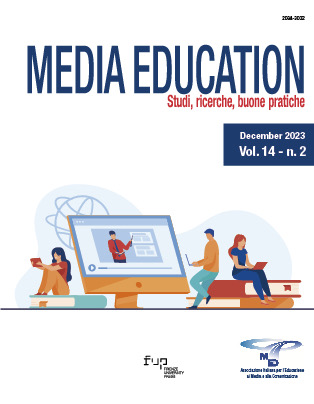Published 2023-12-31
Keywords
- addictions,
- adolescents,
- digital citizenship,
- civic education,
- IAD
- school ...More
Copyright (c) 2023 Lidia Di Giuseppe

This work is licensed under a Creative Commons Attribution 4.0 International License.
Abstract
The article provides an account of a research/Teaching unit that took place in a Classical High School in Rome. It began at the end of the I year and developed in the I quarter of the II year, divided into two phases, as part of the Civic Education lessons. The first purpose was to make students aware of the problems of Internet addiction, to make them self-conscious of the risks that they can run, especially following a period of pandemic, which has forced the entire Italian (and world) population to confinement at home. The second purpose was to test whether the use of concept maps was indeed useful in producing in students the desired knowledge about Internet Addiction Disorder. Concept maps were created first on research made independently by the students, then through a summary on the topic provided by the teacher. After each of the two steps, the same questionnaire was administered: the results were finally compared. It turned out that, in the transition from Step I to Step II, new learning had indeed occurred. The learning experience was fully satisfactory, and the pupils themselves confirmed that the concept maps helped them to organize and deepen the new knowledge they were acquiring.
References
- Ausubel, D. P. (1963). The psichology of meaningful verbal learning, Grune & Stratton.
- Ausubel, D. P. (1978). In defense of advance organizers: a reply to the critics. Review of Educational Research, 48, 251-257. DOI: https://doi.org/10.3102/00346543048002251
- Bezzi, C., & Baldini, I. (2006). Il brainstorming: pratica e teoria. Franco Angeli.
- Buckingham, D. (2020). Un manifesto per la media education, Introduzione e trad. it. a cura di Cappello, G. Mondadori Education.
- Cerniglia, L., Zoratto, F., Cimino, S., Laviola, G., Ammaniti, M., & Adriani, W. (2017). Internet Addiction in adolescence: neurobiological, psychosocial and clinical issues. Neuroscience and Biobehavioral Reviews, 76, 174-184. DOI: https://doi.org/10.1016/j.neubiorev.2016.12.024
- Di Mele, L. (2010). Teaching media in the school: observing and monitoring. Atti del Convegno Alfabetización mediática y culturas digitales, Siviglia, 13-14 maggio 2010.
- American Psychiatric Association (2014). Manuale Diagnostico e Statistico dei Disturbi Mentali, V ed.; ed. italiana a cura di Biondi, M. Raffaello Cortina.
- Jenkins, H. (2010). Culture partecipative e competenze digitali. Media education per il XXI secolo, Guerini e Associati.
- Kuss, D. J., van Rooij, A., Shorter, G. W., Griffiths, M. D., & van de Mheen, D. (2013). Internet addiction in adolescents: Prevalence and risk factors. Computers in Human Behavior, 29 (5), 1987-1996. DOI: https://doi.org/10.1016/j.chb.2013.04.002
- Musetti, A., Cattivelli, R., Zuglian, P., Terrone, G., Pozzoli, S., Capelli, F., & Castelnuovo, G. (2017). Internet Addiction Disorder o Internet Related Psychopathology? Giornale italiano di psicologia, 44 (2), 359-382.
- Novak, J. D. (1977). A theory of education. Cornell University Press.
- Novak, J. D. (2012²). Costruire mappe concettuali. Strategie e metodi per utilizzarle nella ricerca, trad. it. a cura di Boccali, R., Calovi, C., & Canuti, C. Erickson.
- Novak, J. D. & Gowin, D. B. (1989). Imparando a imparare, trad. it. a cura di Caravita, S. SEI.
- Shaughnessy, J. J., Zechmeister, E. B., & J. S. Zechmeister (2012). Metodologia della ricerca in psicologia, ed. it. a cura di Lanz, M., Amoretti, G., & Tagliabue, S. Mc Graw Hill Education.
- Zammuner, V. L. (1998). Tecniche dell’intervista e del questionario. Il Mulino.

